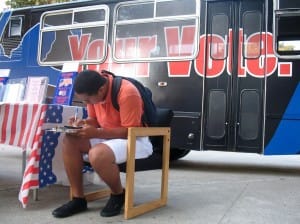Voter registration systems in need of reform

Voter registration systems in the United States are in need of serious reform. According to a new report from the Pew Center on the States, the voter registration process in states across the country is “plagued with errors and inefficiencies that waste taxpayer dollars, undermine voter confidence, and fuel partisan disputes over the integrity of our elections.”

Among other things, researchers found that one out of every eight listings, totaling 24 million, were either invalid or inaccurate, that 2.75 million people are registered in more than one state and that 1.8 million deceased people are still listed as active voters. In addition, the team found that over 50 million eligible voters, roughly one in four, are not even registered to vote. And this latter number may overestimate the rate of registration. A Census Bureau report from May 2010 on voter turnout in the 2008 elections found that nearly 30% of eligible voters were not registered.
Registration systems employed across the country are not only inefficient, they are expensive. A study of Oregon's registration system found that the processing and maintenance of voter registration rolls cost $4.11 per active voter. The electronic system employed by Canada in its registration process, on the other hand, costs less than 35 cents per voter and has resulted in nearly universal registration, with 93% of the eligible population represented on the rolls.
The report faults the paper-based system and the resulting need for manual data entry at elections offices for the inefficiencies, and recommends the digitization of the process via online registration. Those who have changed their residence within the previous two years are most likely to have problems with their registration, the report found. The problems with the system thus disproportionately affect those who are most likely to move, including the young, those serving in the military and those who have been most adversely affected by the economic recession.
The Census Bureau report from 2010 found that, among those who stated they were registered to vote in 2008, nearly 1 million did not vote in that year's election because they had a registration problem of one sort or another. Among those who were not registered to vote at all, over four million stated that they could not vote because they missed a registration deadline, while another 1.3 million said they did not know where or how to register. Citing a separate study from 2008, the Pew report states that more than 50% of voters were not aware that they could update their registration information at the local Department of Motor Vehicles.
Given the history of voter registration in the United States, it is not surprising that the registration process results in the depression of voter turnout. Fair Vote writes that:
Voter registration originated in the early 19th century as a method of disenfranchisement. Many states were concerned with the growing number of foreign-born transients participating in local government, and so they developed a system of registration to ensure that these non-citizens could not vote. While this did disenfranchise transients and the foreign-born, many poor citizens were also not included on the voter rolls.
In advocating universal registration, Fair Vote recommends simple reforms such as automatic registration on the basis of existing government databases and allowing youth to register in advance of their 18th birthday.


